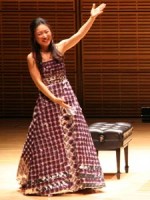Title
This past August, pianist Soyeon Lee was walking around the Princeton University campus. As the recipient of Juilliard’s William Petschek Piano Debut Award in 2004, her life since graduation has been dazzlingly full of opportunities to perform. But on this particular stroll, Soyeon wasn’t thinking about one of her own performances, but rather of the recent Live Earth Concert (held on seven continents on July 7) and what a powerful impact it had had on her. If these musicians were able to convey such a powerful message of sustainability and commitment to change through their music (mainly rock), she reasoned, what was keeping her from giving voice to the same concerns through her own medium (primarily classical music)? As she walked along, turning these thoughts over in her head, she noticed that she was continually stepping on or around some very shiny, colorful trash. Closer inspection revealed them to be empty juice-drink pouches (the soft kind, with the straw glued to the side). During the summer, the Princeton campus is host to hundreds of schoolchildren participating in summer programs—hence the abundance of this colorful detritus. Soyeon knew that a project had recently begun to collect and recycle these pouches … but how could it relate to classical music? Her solution was as colorful as the gleaming trash covering the ground.
Body
Soyeon had a recital coming up at Zankel Hall on February 19; what if she tweaked the program of the concert to accommodate the theme of recycling, while wearing a dress made entirely of these empty juice pouches? But how do you go about making a bizarre idea like this into a reality? In the words of another visionary, “Love is all you need.”
Soyeon’s fiancée, Tom Szaky, was featured on the cover of Inc. magazine in July 2006 for his innovative company TerraCycle, whose flagship product is a plant food made from worm poop and packaged in recycled plastic soda bottles. TerraCycle recently teamed up with Honest Tea (which produces the Honest Kids juice in pouches) to create the Drink Pouch Brigade; a program involving more than 600 schools across the U.S., in which the students collect used drink pouches to raise money for their schools or a charity of their choice. The salvaged pouches will be made into a variety of fabulous accoutrements: tote bags, pencil cases, and the like, to be available at some 10,000 retailers by mid-2008.
With the raw material being culled from playgrounds across the country, Soyeon got TerraCycle to commission innovative Brooklyn-born designer Nina Valenti to fabricate the dress she would wear at her concert in February. They collaborated on the design, working to strike a balance between form (if you’re going to use a material as bold as garbage, you need a design that’s bold) and function (allowing her to play unhindered). The striking design they arrived at was a sleeveless gown with a long train.
Her next step was adapting the program. Naming the concert “Re!nvented," she dedicated the second half of the program to her theme of reuse, including a Busoni piano transcription of the Bach D-minor Chaconne for solo violin, and a new work by Juilliard composer Huang Ruo titled Divergence (a version of an earlier chamber concerto reworked for piano and speaker, with Ruo himself intoning a kind of sung poem from the balcony).
When I asked Soyeon what was so crucial about performances like these, she insisted it is no longer sufficient for an artist to simply play well. For Soyeon, it is an artist’s responsibility to be a citizen of the world, to reach out to people and inspire them. For many attending her concert, it was their first experience of classical music, said Soyeon. People often bemoan the decline in interest in classical music. This, Soyeon counters, is not the fundamental problem: the interest in classical music isn’t dying, it is the opportunity to experience it which is at risk. Which is why, she insists, it is so important to reach out to businesses.
Indeed, in a cloistered community of artists such as Juilliard it is easy to dismiss the world of business as an arena of gross opportunism with nothing in common with the lofty goals of the artist. However, this is a dangerous point of view, especially in our current climate of divisive partisanship. Soyoen’s experience is in fact a perfect example of the way in which art can be made both more challenging and more available when artists and business people work to create something new together. It is a wonderful reinvention of the artist-business relationship-and something to think about on Earth Day, April 22.





